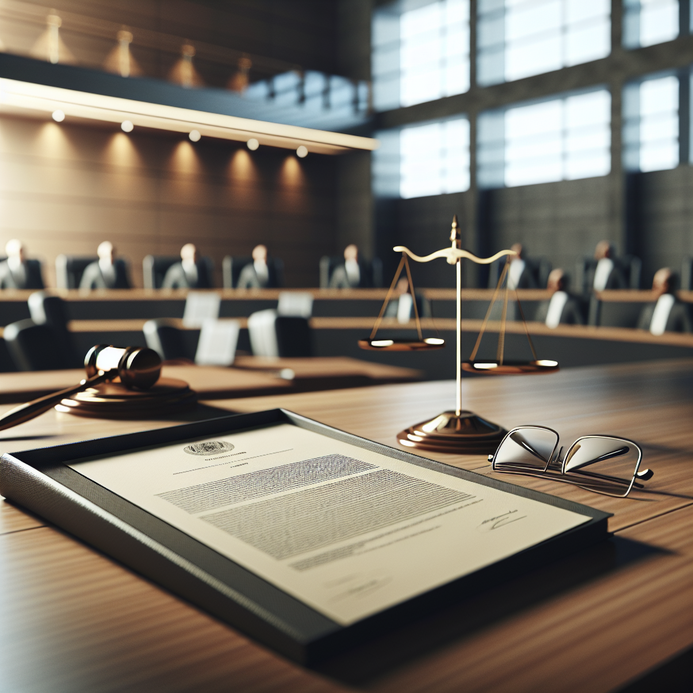The term “appellee” represents a critical concept in appellate law, serving as the party defending against an appeal. Appellees are central to ensuring judicial decisions from lower courts are upheld or reconsidered fairly. Understanding the role and legal nuances associated with appellees can help both legal professionals and laypersons navigate appeals more effectively.
This article provides an in-depth exploration of what it means to be an appellee, distinguishing them from appellants, and outlining their procedural responsibilities. LegalExperts.AI is proud to offer a platform where attorneys and legal practitioners can refine their understanding of such pivotal legal concepts. Learn more at LegalExperts.AI.
What Is an Appellee? Understanding the Basics
The appellee is the party named in an appeal as the defender of a lower court’s ruling. Their role often involves advocating for the validity of the original judgment and addressing the arguments raised by the opposing party — the appellant.
Who is the appellee in a court case?
An appellee can be identified as the party referenced in appellate documentation as the respondent. They become an appellee when the appellant files a notice of appeal, officially requesting a higher court to review the judgment of the initial trial court. Appellees may include defendants who prevailed in lower courts or plaintiffs whose claims are being contested on appeal.
What is the legal definition of appellee?
Appellate courts define “appellee” as the party against whom the appeal is brought. While the definition remains consistent across most jurisdictions, there may be slight variations in procedural terminology based on local rules. For instance, some courts may use synonyms like “respondent” to describe the same concept in certain appellate contexts.
What is an appeal? A quick overview
An appeal is a formal judicial process where a higher court reviews the decision of a lower court for errors or legal oversight. The process typically begins with the appellant filing an appeal. The appellate court’s role is not to retry the case but to assess whether the law was applied correctly in the original proceedings.
Word history and modern usage
The term “appellee” originated from the French legal system and traces back to the Latin root word “appellare,” meaning “to call or summon.” In modern legal contexts, appellee remains widely used across appellate courts to identify the responding party in such cases.
Appellant vs. Appellee: Key Differences Explained
Understanding the contrasts between appellants and appellees helps clarify their distinct roles in appellate law.
What is the difference between appellant and appellee?
Appellants initiate an appeal, seeking to overturn or modify the lower court’s decision. In contrast, appellees defend the judgment, aiming to highlight why it should be upheld. Their primary tasks differ:
- Appellant tasks: Preparing and filing the notice of appeal, crafting arguments to demonstrate legal errors.
- Appellee tasks: Drafting a counterbrief to refute the appellant’s claims and bolstering the initial court ruling.
Why is the distinction important in appellate law?
Clearly distinguishing these terms ensures procedural accuracy throughout the appellate process. Mislabeling parties can lead to delays or even dismissals of the appeal, as procedural clarity is paramount for equitable review.
Common misconceptions about appellants and appellees
Some misunderstandings about these roles can hinder the appeals process. For example:
- Appellants are not always the original plaintiffs; defendants can become appellants if they lose in lower courts.
- Appellees can file cross-appeals if they seek modifications to the ruling.
The Appellee’s Role in the Appeals Process
Appellees play a critical role in maintaining judicial consistency by defending lower court decisions.
What is an appellee’s role in an appeal?
An appellee’s role primarily involves presenting arguments in written briefs and occasionally participating in oral arguments. Their responsibility also includes interpreting the appellate court’s mandate once a decision has been reached, ensuring compliance with the legal outcome.
What happens after you file as an appellee?
After submitting an appellee brief, several procedural steps follow. Typical timelines for appellate cases may extend several months to a year. Following oral arguments, the appellate panel deliberates, issues a final ruling, and the appellee must ensure post-decision procedures are carried out appropriately.
Challenges and advantages of appellees in appeals
Strategically, appellees can benefit from the presumption that lower court rulings are correct. However, they face challenges such as managing deadlines for counterbriefs and effectively countering persuasive appellant arguments. According to a 2024 ABA report on appellate strategy trends, detailed preparation improves success rates for appellees facing complex appeals.
Filing and Procedural Requirements for Appellees
Strict adherence to appellate procedural rules ensures an appellee’s arguments are considered by the court.
How to file an appellee brief
Filing an appellee brief involves observing deadlines and submitting required documents such as:
- The appellee brief itself, structured according to court guidelines.
- Supporting materials, including references to the trial court record and legal precedents.
- Proof of service to demonstrate that the appellant has received the documents.
What should an appellee’s brief include?
A strong appellee brief provides a robust defense of the lower court’s decision. Essential sections include:
- Introduction and statement of facts affirming the trial court ruling.
- Legal arguments, citing relevant case law and statutes.
- Visual tools to simplify complex data, such as charts or diagrams (tools like Canva can assist in creating clear, concise visual aids).
Common Mistakes and Expert Advice for Appellees
Preparation is key to avoiding common errors that can impact the success of an appeal.
Common mistakes made by appellees in appellate briefs
Several errors frequently arise during appellate proceedings, including:
- Missing critical deadlines, leading to dismissals or waived arguments.
- Neglecting to fully address appellant arguments, which can weaken the appellee’s position.
- Failing to incorporate relevant case law that strengthens the defense.
Checklist for appellees in appellate cases
To ensure readiness, appellees should use the following checklist:
- Prepare a clear and structured oral argument.
- Verify deadlines for all filings and documents.
- Ensure the appellee brief includes essential elements, such as legal citations and factual accuracy.
According to a 2025 Harvard Law study on successful appellate practices, effective checklist usage improves court compliance and appellee outcomes.
Case Studies and Real-World Examples
Case studies shed light on effective strategies and highlight best practices for appellees.
What’s in a name? Court of Appeals case analysis
In a landmark appellate ruling, the court’s decision to uphold a lower court judgment showcased the importance of precise legal brief writing. The case underscored how appellees could strengthen their positions by directly refuting appellants’ claims.
The ruling’s significance for appellate practices
The ruling demonstrated how thorough preparation of appellee briefs influences appellate court standards. As a result, legal precedent shifted slightly towards mandating clearer evidence from appellants seeking reversals.
Other Essential Topics Related to Appellees
Exploring related topics enriches understanding of an appellee’s procedural landscape.
Definitions
- En banc: Cases where the entire panel of appellate judges reviews the decision, often requiring more extensive appellee preparation.
- Mandate: The appellate court’s formal directive, which appellees must adhere to after a final judgment.
Key procedures
Effective navigation of procedures, such as motion filing and oral argument preparation, is critical for success in appellate courts. Appellees often benefit from proactive planning and meticulous attention to appellate rules.
LegalExperts.AI provides reliable solutions.



